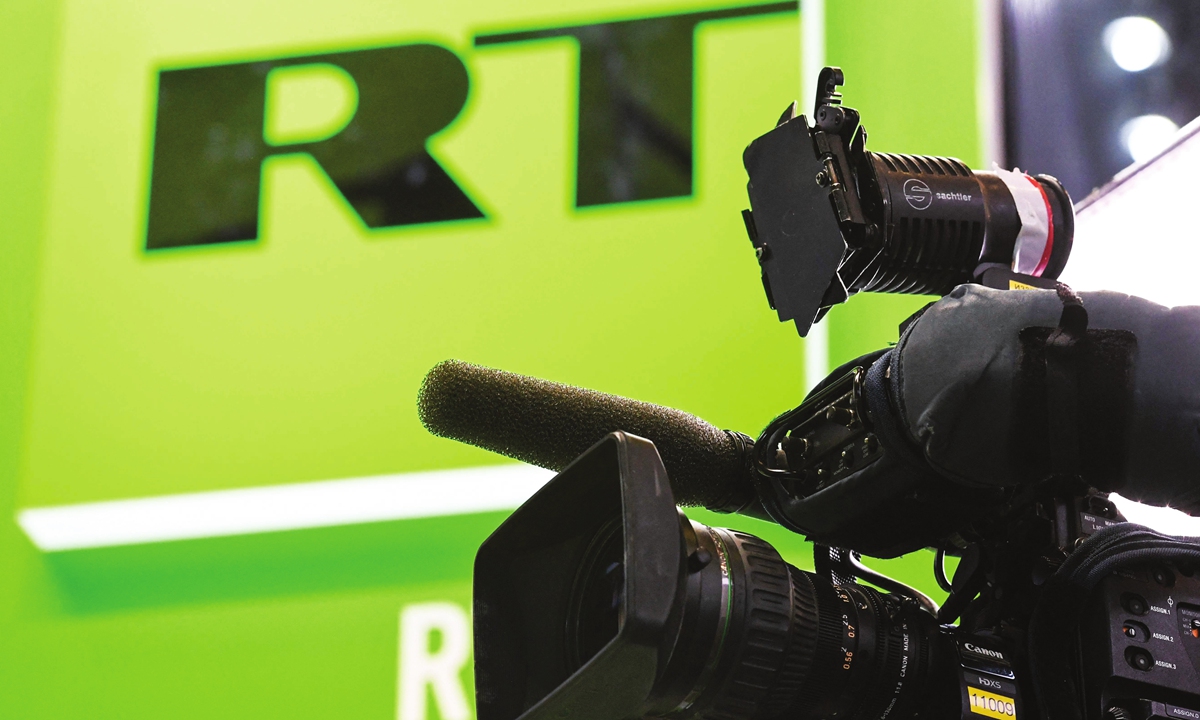
Photo: VCG
Editor's Note:
During the past decade, the world has increasingly witnessed the trend of "the East is rising, and the West is declining" in the spheres of economy, security and discourse power. The Western countries, particularly the US, plagued by internal woes, have sought the old path of passing the buck and instigating turmoil elsewhere to ease their own pressure. China, representative of the emerging countries, is proposing the new solutions to global problems. By advocating win-win development, facilitating consultation and reconciliation, proposing a balanced and effective security mechanism, China is striving for building a community with a shared future for mankind.
In the first of the series, Margarita Simonyan, editor-in-chief of RT, told Global Times reporter Xia Wenxin how voices from countries such as Russia and China have entered the scene and gained traction internationally, breaking the monopoly of the Western media in global public opinion.
GT: Russia Today (RT) is well known in China, and we all think that RT is quite "combative" (in a good way). Are you satisfied with RT's and personally, your work?
Simonyan: I am very proud of the work that RT has accomplished over the last 17 years. We have been broadcasting in over 100 countries, becoming the first TV news channel in the world to hit 10 billion views on YouTube. In March 2022, before we were unceremoniously removed from a number of digital platforms, we hit a record 200+ million monthly visits to our websites, coupled with a regular weekly TV audience of 100 million viewers globally - ahead of much of our competition. We did all this by covering stories that the mainstream media was afraid to touch or show the full picture. We believe that this very success is what led to a campaign to shut down RT and restrict access to our services.
GT: Just like RT, many Chinese media also face restrictions in the US. How do you feel about the rise of non-Western English-language media outlets, such as RT and the Global Times? How much of a challenge do their voices pose to the traditional media in the US and the West?
Simonyan: When we started RT, we genuinely expected to be accepted by the greater media community. Indeed, for decades we had been taught that diversity of voices was paramount to a well-informed society and to the greater global understanding, and we welcomed other, foreign voices in turn in Russia. But the supposed media freedom endlessly heralded by the Western establishments has turned out to be entirely false. The minute that our voice and that of others outside this narrow echo-chamber, whether they are from China, Latin America or the Middle East, entered the scene and gained traction internationally including in the US and Europe, it was those who used to lecture us on media freedom that launched campaigns to shut us down and shut us out of the public discourse.
GT: Based on RT's experience, how do you get your voice out to countries unfriendly to Russia?
Simonyan: The landscape is shifting on an almost daily basis. We continue to use all legal means at our disposal to bring RT's voice to audiences that desire and need it across the world. In fact, it is the desire for our output from such audiences that provides the impetus for us to keep seeking new platforms and challenge the restrictions put on us.
GT: RT now is being blocked by the US and the West in general. What kind of truth can be seen from RT's blockage? To what extent has this affected RT and what is your plan?
Simonyan: The demand for someone to complete the picture of news and not just repeat the same views and opinions as mainstream Western media is great, and will remain so, all around the world. When the Western media's political establishments seek to suppress an outlet like RT, they are ignoring the demand for diversity from their own public, and are only showing viewers a reality that does not reflect even their own backyards, let alone the bigger, balanced global picture. It's precisely this narrow thinking that has led to audiences, particularly in the Western world, to increasingly lose trust in their own news media.
It is overtly clear that RT's blocking, without any just cause or legitimate legal grounds, serves to demonstrate the level of fear that exists among Western establishments and their respective media over something so simple as telling the truth, as well as the hypocrisy of the values they have long preached to the rest of the world. Our plan is to keep reporting from the frontlines, and to keep showing what is going on in the world.

Margarita Simonyan Photo: Courtesy of RT
GT: On the military conflict between Russia and Ukraine, is Russian media coverage of it being able to sufficiently suppress Western propaganda in Russia? Has Western media stopped infiltrating Russian society since the war broke out?
Simonyan: It is not RT's goal to shut out any kind of voice or information, as long as it is truthful and facts-based. This aligns directly with the primary mission of our own journalists: to bring forth the truth of what is going on in Ukraine, in Russia, in the world. That's why our fearless reporters have been on the frontlines of the special operation in Ukraine for the last three months - and in the DNR and LNR for the past eight years of conflict there - showing the reality of what is going on each and every day. Our mission is to do our job as journalists, and we receive daily confirmation from people inside and outside of Russia that we do it well, and our audiences thank us for it.
GT: Last June, you commented that a comparison between Chinese social networks and YouTube is a comparison between a fighter jet and a rusty bicycle. Such a statement was hotly discussed in China. Can you elaborate on why you made such a comparison?
Simonyan: China has demonstrated that it is absolutely possible to create its own independent digital, technological and media ecosystems, which are not just on par but often superior to their Western counterparts. We have seen over the last years that a huge part, if not the majority, of the world operates in a media space controlled - essentially monopolized - by a handful of American digital platforms. Behind these platforms, a handful of executives, subject to a single government's control, dictate what kind of information the entire world has access to - this is a travesty. In that regard, China has defied these Western monopolies and managed to safeguard its own digital space, something that is essential to national sovereignty and security of any country, by generating tools like Weibo, WeChat, TikTok, among others, that are now known all around the world.
GT: As far as we know, two of your children are learning Chinese because "China is one of the most important countries in the world now and will become stronger in the future," as you explained. In your opinion, how has China changed in recent decades, and especially in the last decade?
Simonyan: It is undeniable that China has been incredibly successful in securing its own sovereignty and autonomy through significant and strategic investment not just in economic and defense spheres, but in the information and technological space. By deliberately developing those spaces, China has demonstrated a deep understanding of just how essential they are for both the national welfare and geopolitical standing - it has ensured its future on its own terms and largely free from foreign dependence and interference. There are definitely lessons that we can pick up from the Chinese experience.
GT: What advice would you give to your Chinese media counterparts who also target Western audiences?
